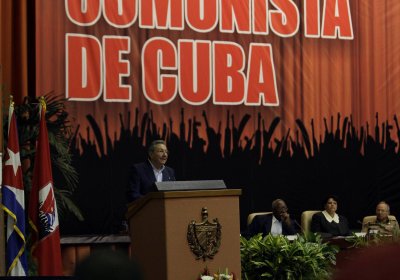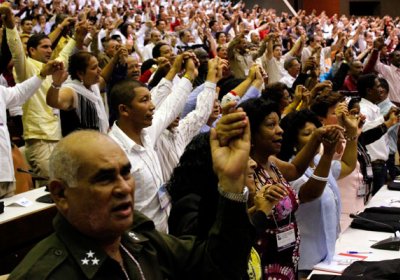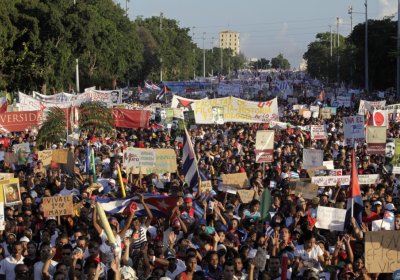At the insistence of the United States and Canada, Cuba was excluded from the Sixth Summit of the Americas, an intergovernmental conference held in Cartagena, Colombia, over April 14-15.
As a result of opposition from many Latin American nations over Cuba's exclusion, as well as Argentina's claim to sovereignty over the Malvinas (Falklands) islands, the summit ended with no final declaration signed.
The summit, involving all nations in the Americas except Cuba, is ostensibly designed to facilitate dialogue, understanding and cooperation between nations of the region.
Cuba
One of the big challenges facing Cuba as it designs climate change adaptation policies is the preservation of its coastal ecosystems against the predicted rise in sea level and increasingly catastrophic extreme weather events.
With the country’s 5500 kilometre of coastline and 4000 cays and islets, almost everyone on the Cuban archipelago feels their life is tied to the sea in one way or another.
“It’s lovely, but it is also dangerous,” said 78-year-old Teresa Marcial, who lives on the coast in Santa Fe, in the northern outskirts of Havana.
Cuban President Raul Castro has urged the Caribbean nation's citizens to contribute to a free and frank debate on the future of Cuba’s socialist project.
For the Cuban Communist Party (PCC), the aim of this debate is twofold: to strive for consensus on a new Cuban model of socialist development and to empower Cuba’s working people to implement what has been decided.
In other words, to advance a socialist renewal process in the face of entrenched opposition from within the administrative apparatus.
Two decades after the demise of Soviet bureaucratic “socialism” and the onset of its “Special Period” crisis, Cuba is immersed in an ongoing debate on the future of its socialist project.
When Raul Castro became interim president in August 2006, he called for free and frank debate. He launched a series of nationwide consultations in the lead-up to the Sixth Congress of the Cuban Communist Party (PCC) in April last year.
Intersecting with these organised debates is a wider discussion in Cuba’s revolutionary press, academic journals and other institutional spaces.
The Cuban Institute of Friendship with the Peoples is inviting all friends of Cuba to join the sixth International Brigade of Volunteer Work and Solidarity with Cuba this May Day.
The brigade runs from April 22 to May 6 this year. It aims to provide a wider understanding of Cuban reality and carry out volunteer work to support agricultural development in Cuba.
The 15-day program includes visits to historical, economic, cultural and social places in Havana and the provinces of Artemisa and Pinar del Rio.
Member countries of Latin America’s alternative integration bloc, the Bolivarian Alliance for the Peoples of Our America (ALBA), met for its 11th summit in Caracas on February 4 and 5 to discuss advancing the organisation.
ALBA is made up of the governments of Venezuela, Cuba, Bolivia, Ecuador, Nicaragua, Dominica, Saint Vincent and the Grenadines, and Antigua and Barbuda. Formed in 2004, ALBA seeks to develop trade on the basis of solidarity and cooperation.
The Sixth Congress of the Cuban Communist Party (PCC), held in April, “endorsed for the first time a fundamental change in the political and economic model”, said Cuban political scientist and Temas editor Rafael Hernandez.
This does not mean abandoning Cuba’s socialist project, but renewing this project after two decades of the post-Soviet “Special Period”. This is a deep structural crisis in Cuba’s post-capitalist, centrally-planned economy and an ideological and ethical crisis of the nation’s socialist vocation.
The Sixth Congress of the Cuban Communist Party (PCC), held April 17-21, coincided with the 50th anniversary of Cuba’s historic defeat of the US-backed invasion at the Bay of Pigs and Fidel Castro’s proclamation of the socialist character of the Cuban Revolution.
When Fidel, 85, made a surprise appearance at the Congress closing session, many of the thousand delegates were overcome with emotion as aides helped him to his seat next to President Raul Castro.
Seven years after being launched by the Venezuelan and Cuban governments, the Bolivarian Alliance for the Peoples of Our Americas (ALBA) has become an important voice on the global stage willing to stand up and denounce capitalism.
ALBA has grown to include eight Latin American and Caribbean countries (Venezuela, Cuba, Bolivia, Ecuador, Nicaragua, Antigua and Barbuda, Dominica, Saint Vincent and the Grenadines.
In October, the Sydney branch of the Australia-Cuba Friendship Society (ACFS) toured Dr Merita Armindo Monteiro, an East Timorese doctor trained for free in Cuba. Armindo Monterio is also an activist in the Timor Leste-Cuba Friendship Association.
Since 2004, Cuba has undertaken a large-scale medical training program for East Timor and sent hundreds of Cuban medical personnel to work on the island. Cuban medical collaboration in the region has since been extended to Kiribati, Nauru, Vanuatu, Tuvalu and the Solomon Islands. Papua New Guinea may soon benefit from Cuba’s generosity as well.
Cuba is a world leader in ecologically sustainable practices. It is the only country to have begun the large-scale transition from conventional farming, which is heavily dependent on fossil fuels, to a new agricultural paradigm known as low-input sustainable agriculture.
Thriving urban organic farms feed and beautify Cuba’s cities, strengthen local communities and employ hundreds of thousands of people thanks to government support.
On October 7, Rene Gonzalez will be released from a United States prison in Florida after serving a 15 year sentence. Gonzalez is one of the Cuban Five — five Cuban men jailed in the US for infiltrating right-wing anti-Cuban terrorist groups to defend the security of the Cuban people.
The US government is now trying to stop Gonzalez’s immediate return to his homeland after his release. In the most cynical and mean-spirited fashion, a US court is extending his punishment by making him spend three years on probation in Florida.
- Previous page
- Page 15
- Next page







